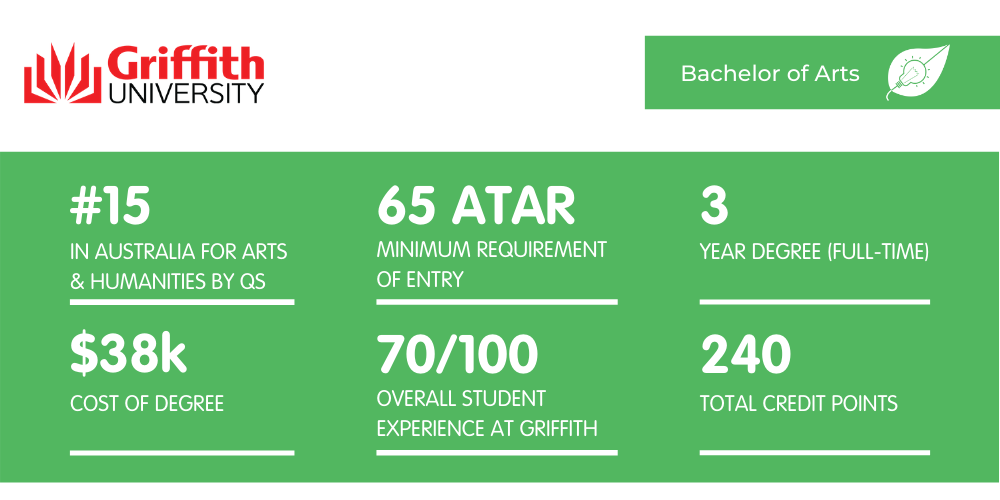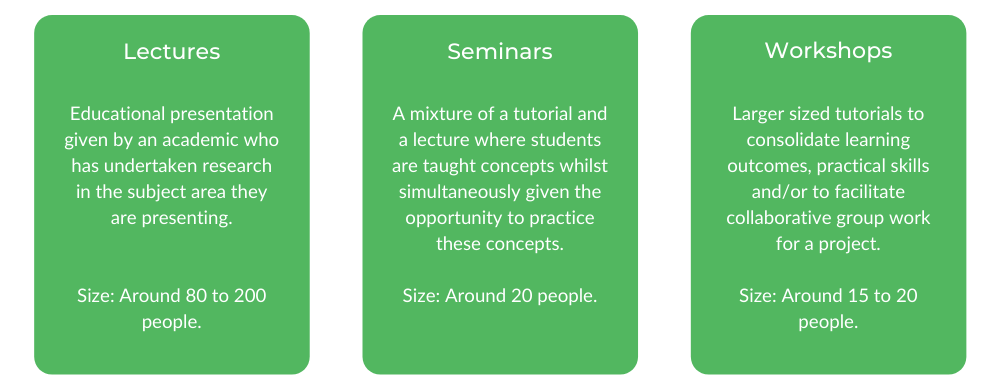
Are you not sure about what you want to do after high school? Maybe a Bachelor of Arts at Griffith University is an option you’ve considered.
A Bachelor of Arts is a great way to pursue your general interests, and we’ve got all the info you need in one spot to help you decide if the degree at Griffith is the one for you!
So let’s jump into it!
What is a Bachelor of Arts at Griffith University?
Core Units and Majors
How to Get into a Bachelor of Arts at Griffith University
What’s the Teaching Format?
What’s the Faculty and Culture Like?
What is a Bachelor of Arts at Griffith University?
A degree in Arts means that you complete majors, minors and electives in a range of subject areas throughout social science or humanities. This means you could study anything ranging from languages to history!
The great thing about an Arts degree is that you can choose to focus on areas you’re really interested in. The flexibility of a Bachelor of Arts means that you can venture into areas of study that you have always wanted to know more about, through your electives and minors.
Essentially, you can tailor this degree to your personal interests!
Can this degree be studied in conjunction with another or completed as Honours?
It’s very common to complete a Bachelor of Arts with a second degree that is more specific and often more career focused. At Griffith University, you can choose to double in Arts with Law, Business or Science.
If you wish to complete Honours, this can be done in an additional fourth year where you’ll complete 30 credit points of course work and 50 credit points worth of research. Note that you need to maintain a Grade Point Average (GPA) of 5.0 or more to be eligible for honours.
Career Paths
The career paths for an Arts graduate are incredibly broad depending on your major and if you choose to complete a double degree. Generally speaking, some of the careers you could venture into are:
-
- Journalism
- Community development
- Arts management
- Research
- Web production
- Administration
- Information management
- Welfare services
Core Units and Majors
At Griffith University, you must complete a couple of core units in an Arts degree, however the main core subjects will depend on the major you choose.
The common core subjects that Arts students will take at Griffith University are Communication and Culture (1506LHS) and Foundations of Academic Writing (1019LHS).
“Griffith tailors your experience to whatever your degree is and the general area, so they won’t make you do arbitrary subjects.” — James Donnelly, Bachelor of Laws/Bachelor of Arts (Japanese) Graduate
In Communication and Culture you will be introduced to a range of skills in relation to both communication theory and application.
With Foundations of Academic Writing you’ll be prepared for the standard of writing and academic practices at university. It’s an important introductory course that focuses on concepts from argumentation and audience, to purpose and genre.
Majors
There is an incredibly large pool of majors that you can choose from if you study a Bachelor of Arts, including:
-
- Creative Writing
- Popular Culture
- Sociology
- Journalism
- History
- Criminal Justice
- Drama
- Strategic Communication
What’s a major in Japanese like?
“Speaking from my experience [as a Japanese major], there is definitely an approachable and flexible atmosphere. The staff were genuine and helpful to the students. The students, my peers, were a lot more down-to-earth and a lot more collaborative in speaking and practising dialogue between students.
“You have to practise speaking the language in order to learn it, so we were given a lot of opportunities to speak it; that’s what the workshops were for.” — James Donnelly
Which areas can you minor in?
You could also choose to minor in some of the following areas:
-
- Digital Media Production
- Screen Studies
- Gender Studies
- Translating and Interpreting for Chinese Speakers
- Environmental Humanities
- Art History and Theory
You can check out all your major and minor options here!
Are there opportunities to take on internships?
In your third and final year of the degree you will have the opportunity to complete either an independent or community internship, worth 10 credit points (3200LHS and 3002LFC respectively).
“In my final year of the Arts degree they did a work-integrated placement. Three days of placement in a personal injury firm with a lot of Japanese clients, so it tied in with my Law degree as well.” — James Donnelly
How to Get into a Bachelor of Arts at Griffith University
The minimum ATAR requirement for a Bachelor of Arts at Griffith is a 65 ATAR.
Alternate Pathways
You can also receive early guaranteed entry into Griffith University with your QCE, IB Diploma or HSC results. The requirements can vary, but generally speaking, you need to have a passing grade average across our subjects.
You can find out more about this early entry scheme here!
There are also a number of admission pathways you can take to get into a Bachelor of Arts, that does not rely on your ATAR. These admission pathways depend on your personal situation, however some of the pathways available are:
-
- Griffith Personal Statement: Relies on your professional skills and personal knowledge
- Griffith College: Provides admission into undergraduate degrees with additional study
- Upgrading via University Study: Studying a similar degree to then transfer to the desired course
These are just a few of the many admission pathways at Griffith University.
Recommended Studies
Although there are no prerequisites for a Bachelor of Arts at Griffith University, depending on your chosen major, it may be useful to have studied a relevant subject area in high school.
For instance, if you’re considering a major in History, having done Modern or Ancient History in high school may be useful. That being said, there is nothing stopping you from choosing the History major if you have an interest and passion in it!
Scholarships
Depending on your personal circumstances and also major of choice, there are a variety of different scholarships that you could apply for at Griffith University.
Find out more about scholarships here!
What’s the Teaching Format?
Griffith University currently runs in a trimester format, which is three academic sessions a year. Again, depending on your major in Arts, the format of classes may vary.
However, it is most common to have lectures, alongside seminars or workshops every week which are likened to tutorials.
Class Structure

Workshops
Workshops have 15 to 20 students and run from 1 to 1.5 hours, on a twice weekly basis. In workshops you do a lot of practical learning.
For instance, if you are studying a language, you will practise speaking to your peers and applying the new words or phrases you’ve learnt.
Seminars
Seminars have a similar class size of around 20 students and generally run for 2 hours, once a week. Seminars are a combination of lectures and workshops, where you learn and apply content in the class.
Lectures
Lectures can have anywhere from 80 to 200 students depending on the cohort size. They will normally run for 2 hours, once a week.
In lectures, you can expect more of a one-way learning environment where you are learning content and taking notes to then be prepared for the workshop or seminar for that week.
How much time do you spend in classes?
Overall, you can expect 3 to 4 hours of classes, per subject, every week. With the trimester model, you are usually doing 3 subjects at a time, meaning the contact hours for Arts at Griffith are around 9 to 12 hours a week.
Assessments
In terms of the types of assessments you would get in an Arts degree, you can expect a fair share of writing, assignments over exams and the occasional group task.
“In the language side, there were a lot of smaller 5% to 10% quizzes, with 3 to 4 of them throughout the semester.” — James Donnelly
However, in terms of Arts at Griffith overall, you can expect one to two heavily weighted essays, a smaller quiz and final exam. Having a mixture of take home essays with final exams is designed to suit all types of students whose strengths lay in different areas when being assessed.
“The 30% to 40% assignments would help out people who weren’t as good at exams, so it was an accurate reflection for how you understood the course content.” — James Donnelly
Skills That You Refine and Learn

As Arts is a particularly broad degree, you gain a really wide range of transferable skills throughout the degree, including:
-
- Teamwork
- Project management
- Flexibility
- Social skills
- Writing skills
- Adaptability
A major characteristic of an Arts degree is that you will rarely be in all the same subjects as someone else.
Every student will be paving their own pathway through different subjects, majors and minors, therefore each class you’ll find yourself in a different setting. This forces you to become more comfortable meeting people for the first time, socialising, adapting to different learning environments, and working collaboratively with other students.

What’s the Faculty and Culture Like?
The culture of the cohort and faculty at Griffith University, specifically in the Arts department, is known to be very supportive, collaborative and encouraging.
There are a whole range of societies you can join to get involved with uni life, alongside making new friends and meeting people with similar interests! Check out the different clubs and societies you can join here.
“The Japan Club is where I met a lot of friends. The best way you can liken it is to the Breakfast Club where people from all degrees are coming together to talk about Japan… Societies definitely bring people together and make it very easy to make friends!” — James Donnelly
Support Programs
There are a number of smaller programs that can support you in many areas of uni, such as note taking services for students who are unable to take their own notes. There is also flexibility in contact hours for students with disabilities, to provide the support needed.
“The university is great with this, they give a lot of support in terms of career counselling; they’re really helpful with CVs and jobs. Griffith is very very passionate about seeing students succeed, so you don’t feel like a number, you are an individual.” — James Donnelly
Mentoring programs are also visible across the university, with Study Support programs to help you improve your skills and gain extra help in certain subject areas.
The Back on Academic Track (BOAT) program is designed similarly, to provide study assistance to students who may be falling behind on uni work or repeating subjects.
Want to know about the pros and cons of this degree? Check out our article here!
Nandini Dhir is a Content Writer at Art of Smart and is currently studying a Bachelor of Arts (majoring in Marketing) and a Bachelor of Advanced Studies (Media and Communications), as a Dalyell Scholar, at Sydney University. She enjoys covering local issues in her area and writing about current events in the media. Nandini has had one of her pieces published in an article with the Sydney Morning Herald. In her free time, Nandini loves doing calligraphy, ballet, and sewing, or is otherwise found coddling her cats.


